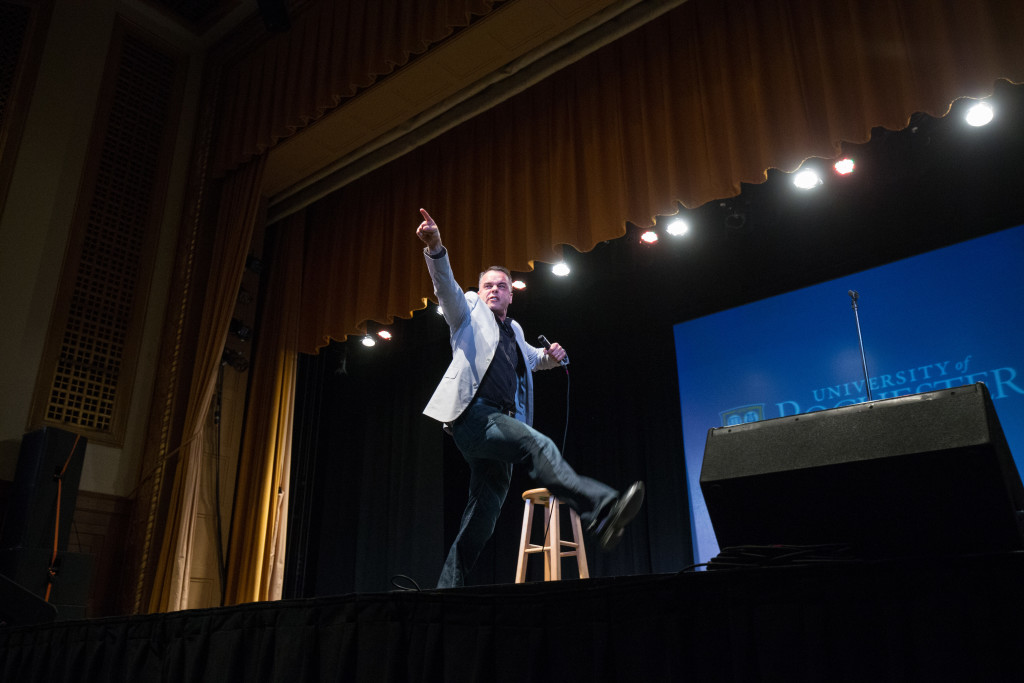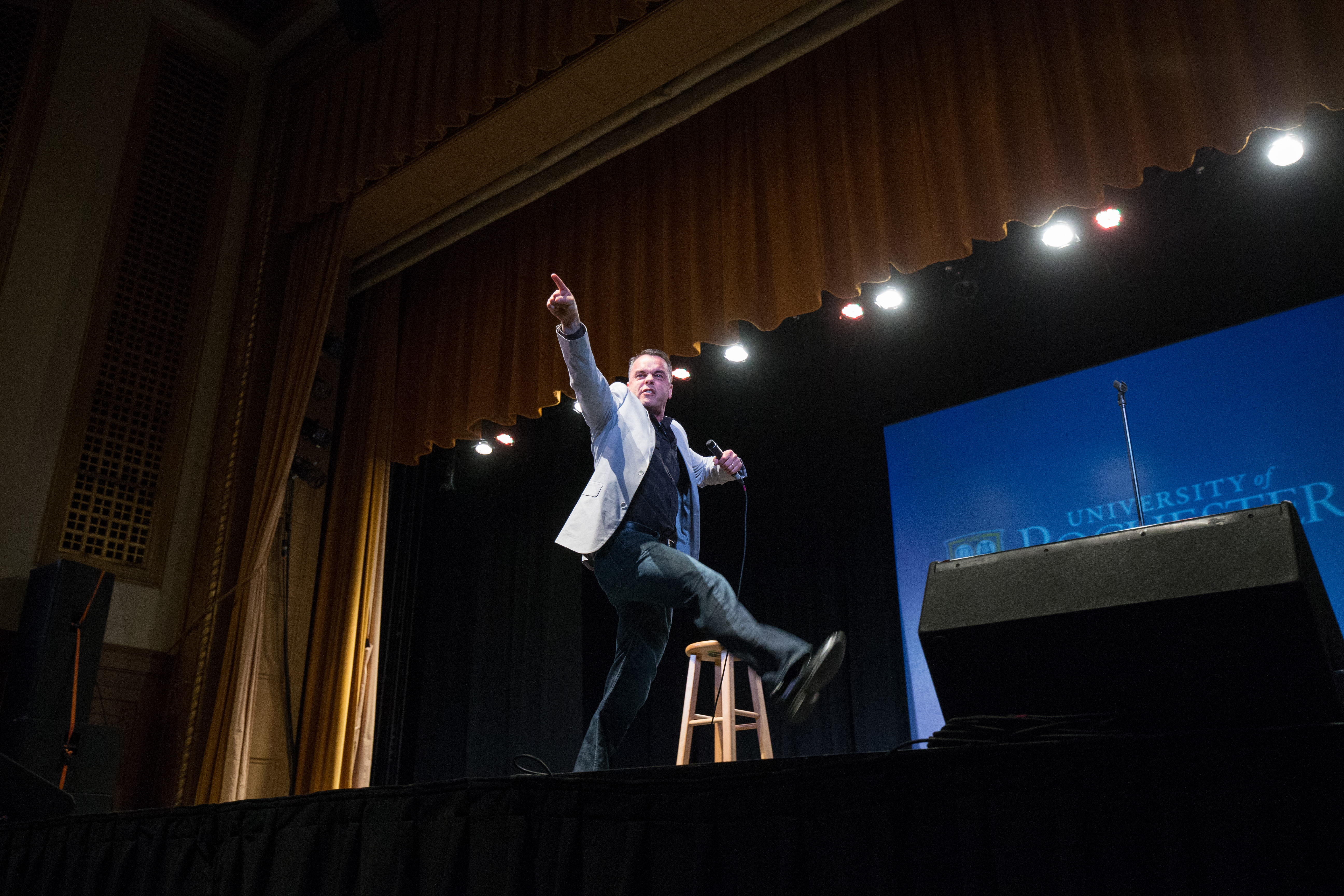Headliners traditionally thank their openers in front of the audience. On Saturday, B. J. Novak did not.
“Don’t even go there!” one student yelled, as comedian Dan Viola diagnosed mental illnesses among the “Winnie the Pooh” characters. Another shouted an expletive when Viola, concluding a baseball joke about well-paid left- and right-handed batters, referred to Caitlyn Jenner as “the highest-paid switch-hitter.”
Viola, booked by the Campus Activities Board (CAB) as the opening comedian for Winterfest Weekend headliner B. J. Novak, received mixed reviews after his Saturday evening act. While most audience members applauded upon its conclusion, a vocal faction of students booed and jeered at Viola.
Junior Nick Potter is among those unhappy with the content of Viola’s act—in particular, the Caitlyn Jenner jab. “When you take someone whose identity comes from a place of social vulnerability, and then you attack that, it just rubs me the wrong way,” Potter said. “I went out for a night of seven-dollar entertainment. I wasn’t there to listen to someone’s identity be attacked.”
Other students did not find Viola’s act offensive. Junior Johnny Jacobs considered some of Novak’s material more offensive than the opener’s, and said that the students who heckled Viola “needed to practice some self-restraint.”
“It’s all a joke and in good fun, after all,” Jacobs said, “the intention being to make you laugh. Either learn to control your anger, or don’t show up.”
Most students, however, are somewhere in-between being offended and finding Viola’s act funny. Sophomore Kirsten Holmberg said that most of Viola’s content seemed “familiar,” and referred to it as “hackneyed, and a little cringe-worthy.” Jacobs, Potter, and others concurred, saying that they had heard many of the jokes before.
In response to the pushback against Saturday’s performance, CAB Administrative Chair and senior Samantha Lish said that the Board has plans to “avoid any future relationship with Viola.”
Viola’s reviews on GigMasters—a website that provides reviews of and contact information for performers, photographers, and other event staff—are distinctly positive. The website allows users to score a performer on a scale from zero to five in the categories “overall satisfaction,” “professionalism,” “accommodating,” “overall talent,” and “recommend.” As of Feb. 2, averaged from 61 reviews, Viola holds a (rounded) 5.0—a perfect score.
The most negative review gave Viola scores between 3.5 and 4.0, and said that his topics were “well-received” and that nobody was uncomfortable. The review, in response to a gig at a university, also claimed that, while performing for college students is challenging, “Dan did well trying not to touch on hot topics that would cause heartburn for anyone.”
Some of Viola’s other jokes that seemed to cause heartburn for UR students included references to drug use and poverty in the nearby 19th Ward neighborhood, a goose-stepping and German-barking Barney impression, and a lead-in to a joke about recycled latex where he quipped that “tree-huggers” sometimes take their conservation efforts too far.
In an interview with the Campus Times, Viola was surprised that his act had offended. “My goal is never shock humor,” Viola said. “It’s not to rankle people. I don’t feel that getting the audience fired up is really ever the direction I want to take it.”
Referring to the Jenner gibe, Viola said that it was “more of a misdirection joke,” and that it was not intended as social commentary—and nor were the rest of his jokes. Similarly, he said that his recycled latex joke—the first to be heckled prominently—was interrupted too early, and that if students had waited to hear the entire joke before they reacted, they likely wouldn’t have been upset by it.
In a post on the event’s Facebook page, junior Stephen Wegman asked if anyone else was offended by Viola’s act. Wegman also requested a statement from CAB explaining how Viola was chosen for the gig, and why he wasn’t interrupted after delivering “anti-Semitic, anti-trans, and anti-Ward/Plymouth-Exchange” jokes. The thread drew heated comments from all sides.
CAB released a statement on Feb. 1, both on the event page and on their own page. Penned by Lish, the statement expressed CAB’s regret that Viola’s act was “offensive to many audience members.”
Wegman explained in an interview that he was neither satisfied with CAB’s statement nor their response during the show, saying he was “disappointed.” Wegman said that, were he in a position to do something about it, he would have interrupted the performance—regardless of the popular opinion of the audience.
Viola said he had not been in contact with CAB or the University following his act on Saturday. When told of CAB’s plans to avoid any future relationship with him, Viola understood. “Hey, if the majority of [the] audience doesn’t appreciate the style or content of my humor,” he said, “then I probably would expect that they wouldn’t invite me back.”
“When it’s fun for the audience, it’s fun for the performer,” Viola continued. “If the overlap in what we agree on is diminishing, then it’s probably not the primary audience for me.” He twice added that he was excited to be involved in a discussion of his comedy in this way, something that he had not previously experienced.
On his website, Viola advertises “Smart, Clean, Funny” comedy, and promises to “entertain without insulting,” though Potter and Wegman thought that Viola failed to deliver. By comedy club standards, Viola said, his act is considered “squeaky-clean,” containing no profanity or overtly sexual material. He acknowledged that there is a difference between clean material and inoffensive material—a distinction that some students were loath to make.
“What we’re talking about here is culture,” Wegman said, explaining why he thought some of Viola’s jokes were inappropriate in any setting. “So no, I don’t think that kind of culture is good.” Wegman added that he thought Novak’s joke that involved a transgender support group was also offensive, but that Novak, unlike Viola, deconstructed the joke to give it context.
While accounts vary among students who felt strongly either way about the act, there was perceptible laughter and applause throughout. Viola said that, after Saturday’s performance, a few attendees whom he did not know reached out to him and told him they enjoyed the show—a gesture that he described as unusual, but likely in response to the fact that others were “very vocal in their displeasure.”
Saturday was not Viola’s first time performing at the University. He opened for “Saturday Night Live” cast members Vanessa Bayer and Jay Pharaoh at Yellowjacket Weekend in 2013, and, according to both Viola and Lish, the performance received no negative feedback. In fact, Viola recalled a great crowd (a review in the Sept. 12, 2013, issue of the Campus Times stated that Viola’s act “only managed a few chuckles here and there”), and said that one of the jokes—the “Winnie the Pooh” routine—used in both the 2013 and Saturday performances attracted scorn only the second time around at UR, and never in the hundreds of other times he has performed it.
Potter admitted that, while he shares in the sentiment of some of the hecklers and supports students’ right to vocalize their concerns, heckling is seldom, if ever, appropriate. But, he concluded, Viola invited at least some of the audience’s response by asking a question. Wegman expressed regret that students hadn’t spoken out more than they did—one reason, he said, that he posted on the event page, providing a mouthpiece for those who were upset.
Viola said he has seen shows in which the comedian went “too far,” and that, in some cases, audiences should be free to express their opinions. At the same time, he believes that audiences should go to live shows with “the expectation that anything is fair game,” and that they should be able to “roll with a lot of topics.”
Everyone whom the Campus Times spoke to agreed that performing for college students is difficult. Some said that Viola simply didn’t know his audience, and jokes that may have otherwise worked in different venues fell flat for UR students. Viola himself admitted that college students are neither his target demographic nor his usual audience, saying that his typical crowds are 25 and older—working people with children, often listening at corporate and private events.
In an email, Lish said that CAB tries to vet some of guests’ performance material, but that they can “never know” what jokes will be delivered. Viola said that, to his knowledge, CAB had not vetted his material. But, echoing Lish, he said that he received the gig through CAB’s booking agent. Viola had a prior relationship with the agent, and said that the agent would have had no problem recommending him as someone “relatively inoffensive and clean.”
The comic thought the agent would be surprised by the negative reaction to the routine.



